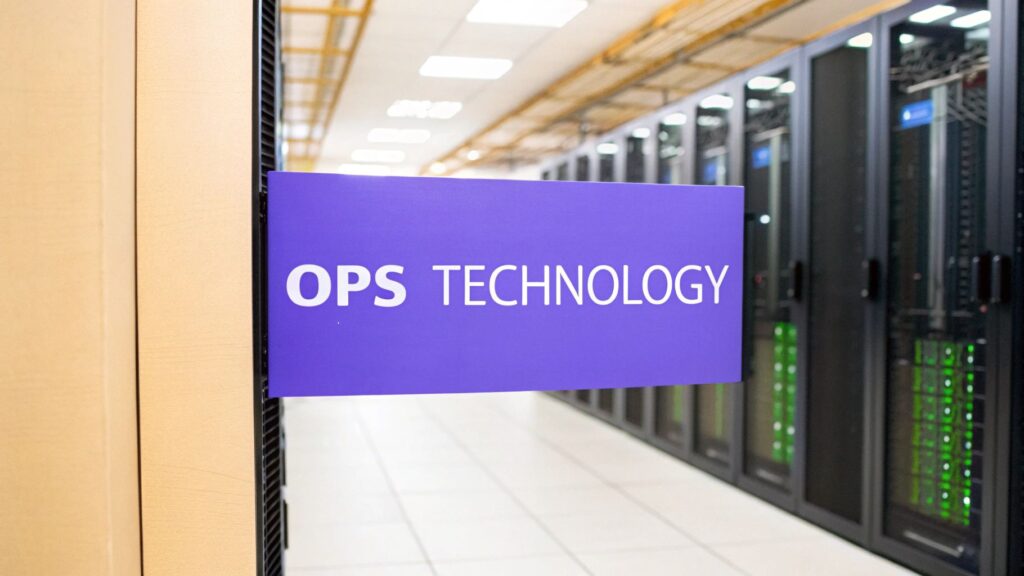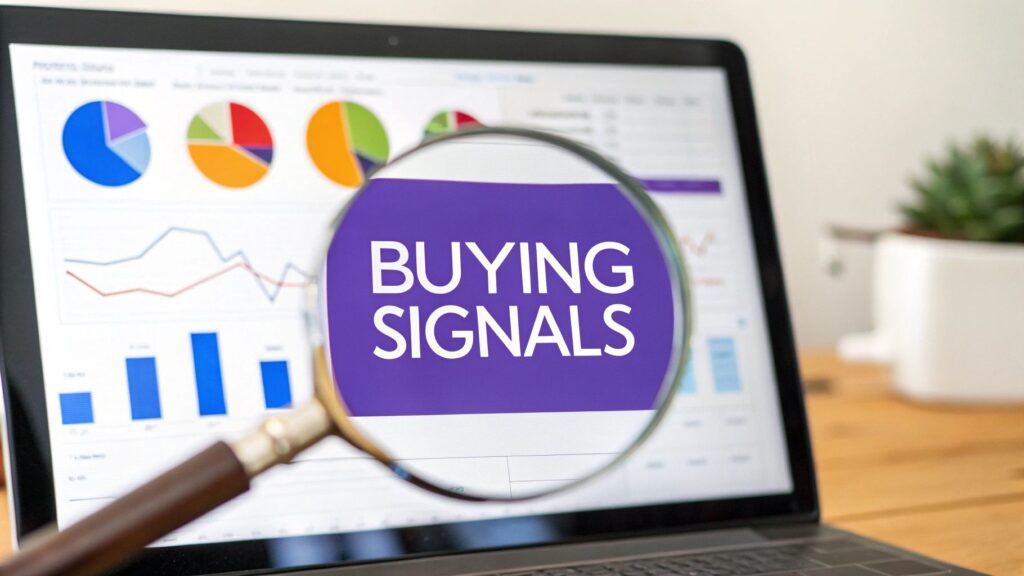12 Best Content Marketing Tools for Agencies in 2025

- 1. FundedIQ
- 2. HubSpot Content Hub
- 3. Semrush
- 4. Ahrefs
- 5. BuzzSumo
- 6. Canva
- 7. Grammarly Business
- 8. Hootsuite
- 9. Mailchimp
- 10. WordPress.com
- 11. G2 – Content Marketing Software Category
- 12. AppSumo – Deals Marketplace for Marketers
- Top 12 Content Marketing Tools Comparison
- Choosing the Right Tools to Scale Your Agency's Content
In a competitive market where over 70% of marketers are actively investing in content marketing, agencies need more than just great ideas; they need a powerful, efficient tech stack. The right content marketing tools can transform your workflow, from identifying high-value topics and creating compelling assets to distributing content and converting leads into clients. But with hundreds of options available, how do you choose the platforms that deliver real ROI and streamline operations for your team?
This guide cuts through the noise. We've curated the 12 best content marketing tools for 2025, focusing on practical applications, honest limitations, and specific use cases for agencies. We will explore platforms for every stage of the content lifecycle: ideation, creation, distribution, and measurement. This allows you to build a streamlined stack that drives measurable growth for your clients and your business.
A primary challenge for any agency is securing a steady pipeline of clients ready to invest. That's why this list also includes platforms like FundedIQ, which specializes in connecting agencies directly with recently funded startups actively seeking marketing partners. Each tool in this roundup includes a detailed breakdown with screenshots and direct links, helping you make informed decisions quickly. Let's dive in.
1. FundedIQ
FundedIQ stands out as an indispensable lead generation tool for agencies, acting as a crucial first step in any high-value content marketing strategy. Instead of a generic content creation or analytics platform, it provides the most vital ingredient for success: a targeted, high-intent audience. It delivers meticulously hand-curated lists of over 1,000 recently funded startups each month, complete with verified decision-maker contacts.
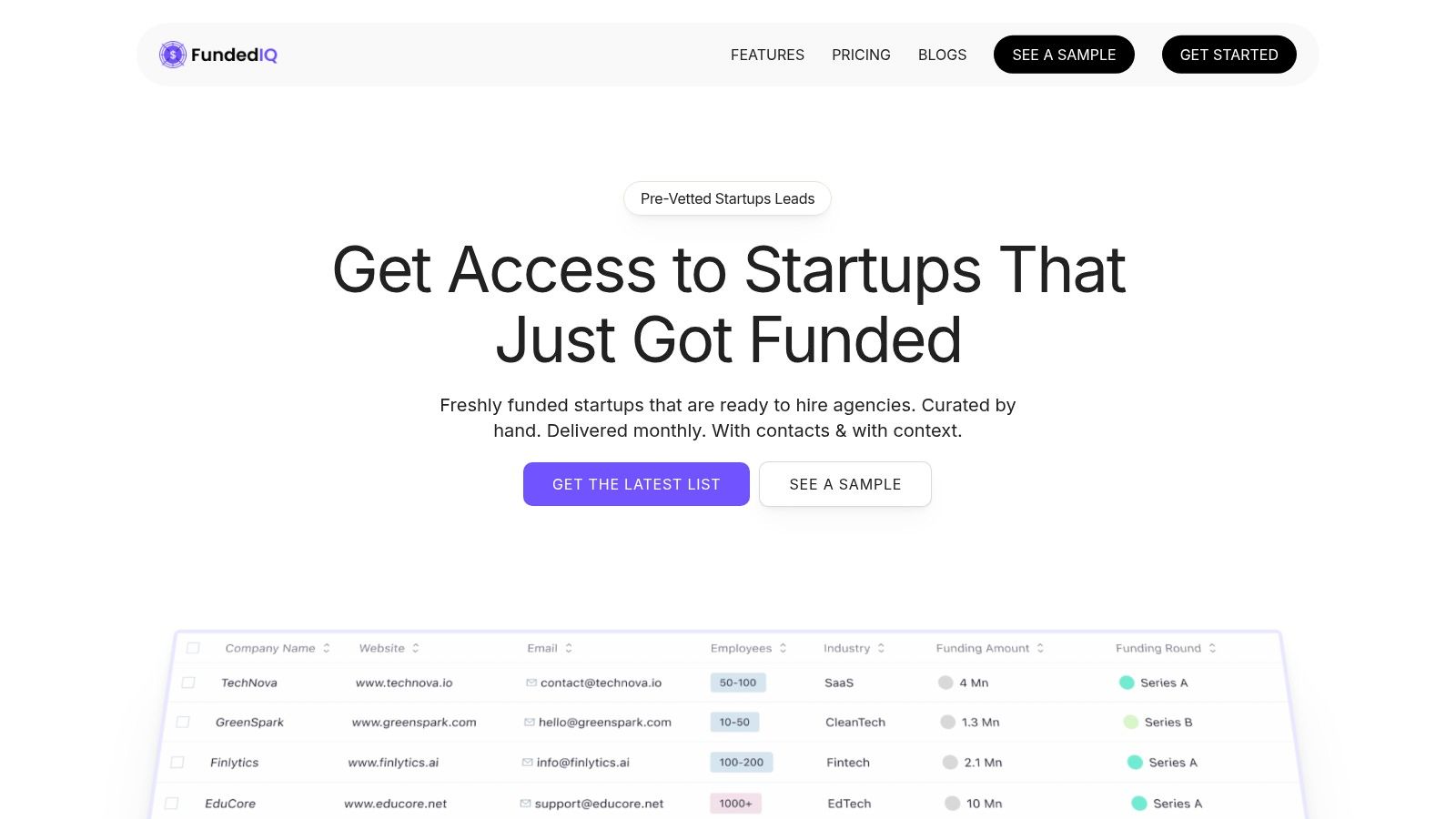
This platform excels by enriching its data with real-time buying signals like hiring surges and new ad campaigns. This intelligence allows agencies to perfectly time their outreach, engaging prospects with hyper-relevant content just as they need it most. By integrating contact information from over 15 premium sources, FundedIQ delivers up to 40% more reachable emails than competitors, a critical advantage for campaign deliverability. For content marketers, this means your case studies, whitepapers, and service offerings land in the inboxes of key executives at companies with fresh capital and a clear intent to grow.
Why It's a Top Choice
FundedIQ’s primary strength is its fusion of high-quality data with actionable intelligence, making it one of the best content marketing tools for audience acquisition. The manual verification process ensures unparalleled accuracy and GDPR compliance, mitigating the risk of wasted efforts on bounced emails or irrelevant leads.
- Practical Use Case: A growth marketing agency can filter for B2B SaaS startups that just closed a Series A round and are actively hiring for marketing roles. The agency can then craft a content-led outreach campaign featuring a case study on scaling user acquisition, directly addressing the startup's immediate growth challenges. This data-driven approach has been shown to improve outreach response rates by over 200% compared to generic campaigns.
This level of precision transforms cold outreach into a warm, context-aware conversation, dramatically increasing engagement and conversion rates.
Core Features & Analysis
| Feature | Description | Strategic Advantage for Agencies |
|---|---|---|
| Hand-Curated Startup Lists | Over 1,000 manually verified, recently funded startups delivered monthly. | Focuses resources on high-potential leads with capital to invest in agency services. |
| Rich Company Profiles | Includes funding rounds, tech stack, web traffic, and estimated IT spend. | Enables deep personalization of content and proposals, demonstrating genuine research. |
| Real-Time Buying Signals | Alerts on hiring surges, new ad campaigns, and expansion efforts. | Provides a perfect trigger for timely outreach when a startup's need is highest. |
| Verified Decision-Maker Contacts | Data aggregated from 15+ premium sources for maximum reachability. | Boosts campaign ROI by ensuring content actually reaches the intended C-suite or VP-level contact. |
Pricing & Access
FundedIQ operates on a refreshingly simple and accessible model.
- Pricing: A flat fee of $47 per month.
- Commitment: No long-term contracts or lock-ins. Subscribers get instant access upon payment.
- Limitations: The platform does not offer a free trial or refunds due to the immediate value and digital nature of the data provided.
Pros & Cons
Pros:
- High-accuracy, manually verified leads for superior outreach quality.
- Actionable buying signals enable perfectly timed, personalized campaigns.
- Delivers up to 40% more reachable contacts than many alternative sources.
- Affordable flat-rate monthly pricing with no long-term commitment.
Cons:
- No free trial requires an upfront financial commitment.
- Niche focus on funded startups may not suit agencies targeting enterprise or public sector clients.
Website: https://fundediq.co
2. HubSpot Content Hub
HubSpot Content Hub is an all-in-one platform designed for agencies and marketing teams that need to centralize their entire content lifecycle. It combines a powerful CMS for blogging and landing pages with built-in SEO tools, AI content generation, and a native CRM. This integration is its core strength, allowing you to tie every content asset directly to lead generation and customer data, eliminating the need for complex, multi-tool workflows. According to HubSpot's own data, businesses that blog generate 67% more leads per month than those that don't, and this platform is built to capitalize on that fact.
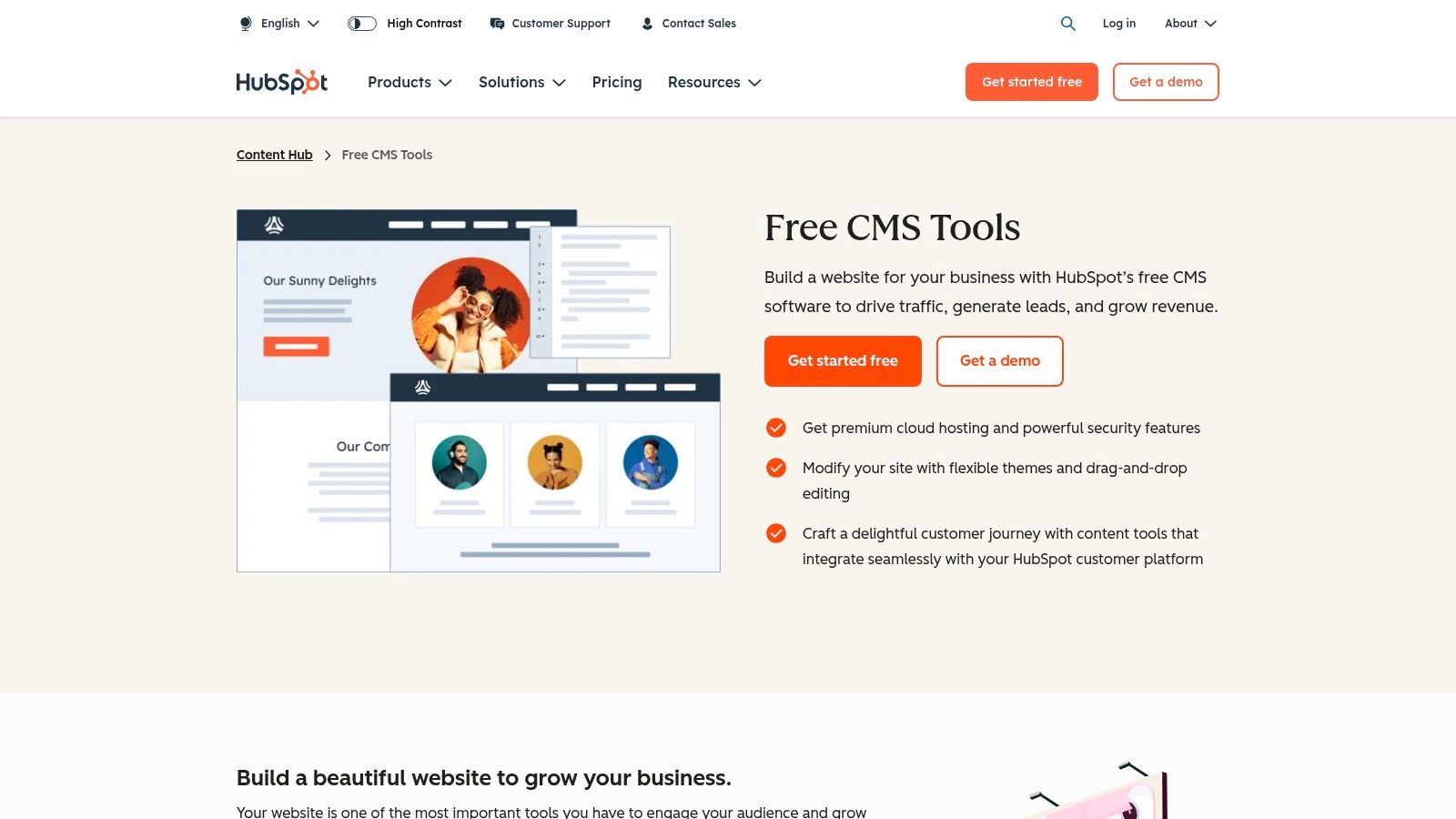
Unlike standalone tools, HubSpot provides a unified view of how content impacts the entire buyer's journey. A practical use case for agencies is using its 'Content Remix' AI feature to repurpose a single research report into blog posts, social media updates, and email campaigns, all tracked against the same contact records in the CRM. This makes it one of the best content marketing tools for demonstrating ROI to clients.
Key Details & Pricing
- Best For: Agencies wanting a single, integrated platform to manage content strategy, creation, and performance analytics.
- Pros: Reduces tool sprawl, excellent educational resources via HubSpot Academy, and a mature, well-supported ecosystem.
- Cons: Can become expensive as your team and contact list grow; governance features in higher tiers can add complexity.
- Pricing: Starts at $20/month for the Starter plan, with Professional plans beginning at $500/month.
- Website: HubSpot Content Hub
3. Semrush
Semrush is a comprehensive SEO and competitive intelligence suite that excels at the data-driven side of content marketing. It offers powerful tools for topic research, keyword analysis, content optimization, and performance tracking, making it an industry standard for agencies focused on organic growth. Its core strength lies in its vast datasets, which include over 25 billion keywords across 142 geodatabases, allowing teams to reverse-engineer competitor strategies and identify high-value content opportunities before creation.
Unlike all-in-one platforms, Semrush is a specialist tool that provides unmatched depth in search analytics. A practical use case for an agency is using the 'Keyword Gap' tool to find valuable keywords that top competitors rank for but the client doesn't. This data can then inform the creation of highly targeted articles using the SEO Writing Assistant to optimize content in real-time. This makes it one of the best content marketing tools for building editorial strategies grounded in solid search data.
Key Details & Pricing
- Best For: Agencies and marketing teams that need deep SEO insights to drive their content strategy and measure organic performance.
- Pros: Extremely broad toolset for content and SEO, massive keyword and backlink databases with frequent updates, and clear plan limits for scalable use.
- Cons: The total cost can increase significantly with add-ons, and there is a steep learning curve for users new to SEO.
- Pricing: Starts at $129.95/month for the Pro plan, with Guru plans beginning at $229.95/month.
- Website: Semrush
4. Ahrefs
Ahrefs is a premium SEO platform with a suite of robust content research tools essential for modern marketing. It excels at identifying high-traffic potential topics and deconstructing competitor strategies. Its core strength lies in its massive backlink index—over 36 trillion links—and keyword database, allowing agencies to uncover content gaps, find link-building opportunities, and build data-backed content strategies from the ground up. This makes it one of the best content marketing tools for competitive analysis.
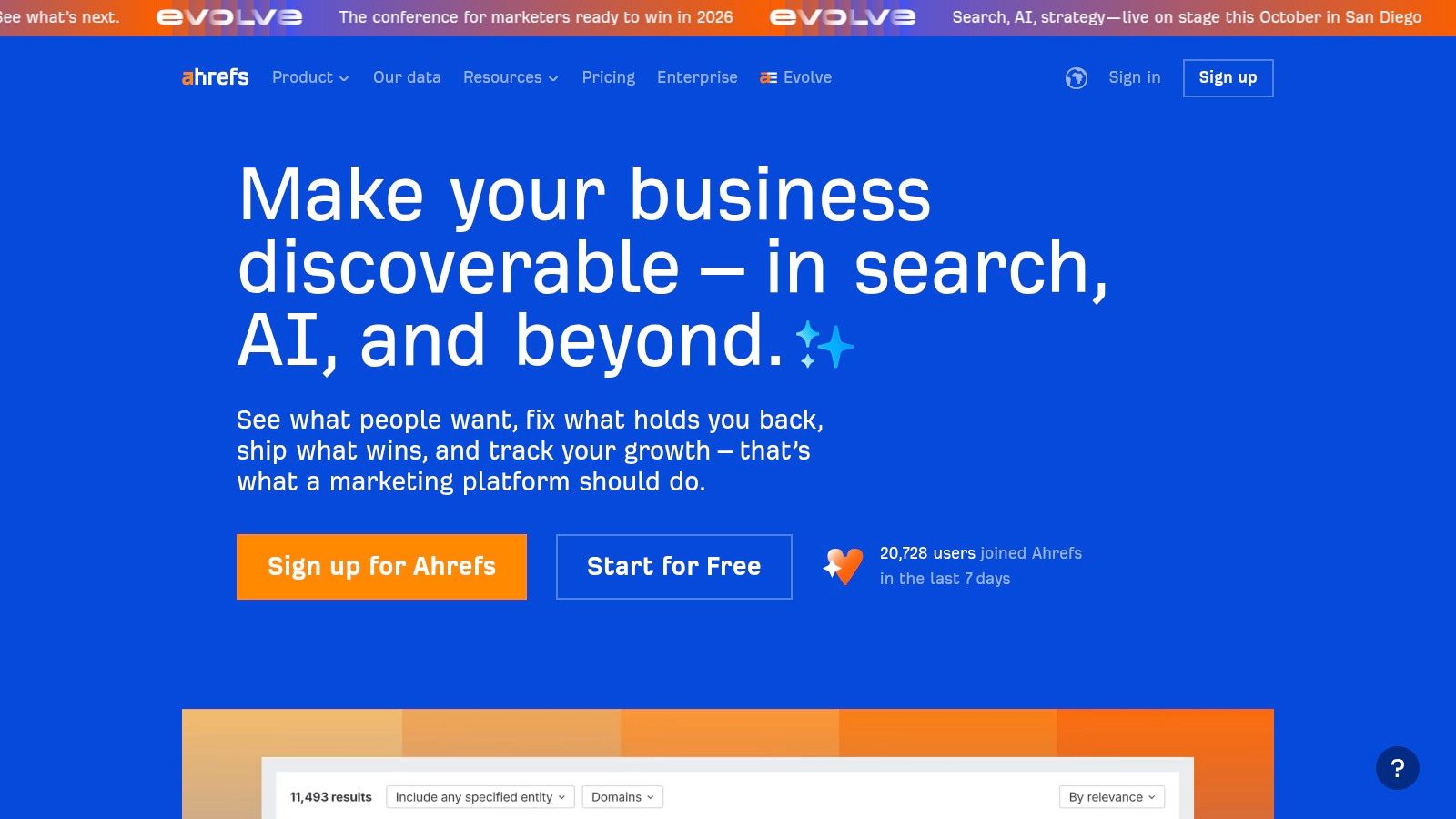
Unlike general-purpose marketing platforms, Ahrefs provides deep, actionable SEO insights. A practical use case is using its 'Content Explorer' to find underperforming articles on a competitor's site that have many backlinks. An agency can then create a superior version of that content and use 'Site Explorer' to reach out to the linking domains, executing a highly effective "Skyscraper" technique to build authority and drive organic traffic. The depth of its data also makes it a valuable asset for teams looking for the best sales enablement tools to inform their content creation.
Key Details & Pricing
- Best For: SEO-focused agencies and content teams needing deep competitive intelligence and data-driven topic ideation.
- Pros: Best-in-class backlink and keyword index depth, fast and intuitive reports, and helpful free Webmaster Tools for site owners.
- Cons: Pricing can become expensive with add-ons for features like daily rank updates, and the interface has a learning curve for beginners.
- Pricing: Starts at $99/month for the Lite plan, with Standard plans at $199/month.
- Website: Ahrefs
5. BuzzSumo
BuzzSumo is a powerful content discovery and research platform designed for agencies and marketing teams that need to validate their content ideas with real-world performance data. It excels at identifying trending topics, analyzing what content performs best for any niche, and uncovering key influencers for outreach campaigns. Its core strength lies in its massive index of over 8 billion articles, allowing you to see engagement metrics (like social shares and backlinks) for virtually any piece of content.
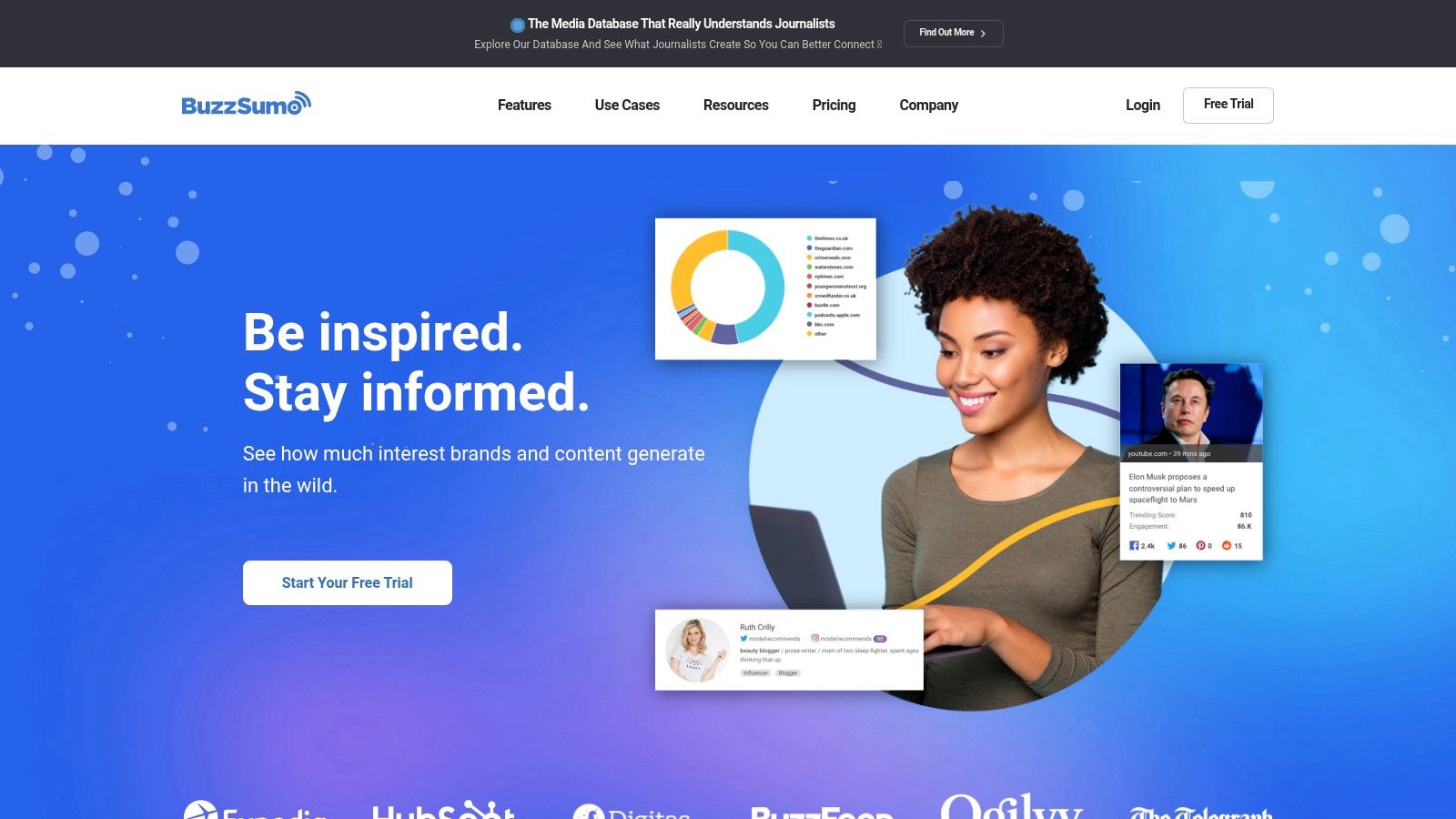
Unlike platforms focused solely on creation, BuzzSumo provides the competitive intelligence needed for a winning strategy. A practical use case for agencies is to research a competitor's top-performing blog posts from the last year, identify content gaps, and then use the Topic Explorer to generate fresh, data-backed ideas that have a high probability of success. This makes it one of the best content marketing tools for developing evidence-based strategies that resonate with target audiences and drive results.
Key Details & Pricing
- Best For: Content strategists and PR teams needing to validate topic ideas, find influencers, and analyze competitor content performance.
- Pros: Excellent for validating content ideas based on real engagement data, strong PR and journalist outreach datasets, and generous export options on paid plans.
- Cons: No permanent free plan is available (only limited-time trials); key features are gated across different pricing tiers.
- Pricing: Paid plans start at $199/month, with options for larger teams and more extensive monitoring features.
- Website: BuzzSumo
6. Canva
Canva is a versatile design and content creation suite that empowers marketers to rapidly produce high-quality visuals without needing professional design skills. It excels at democratizing content creation, offering extensive templates for everything from social graphics and blog headers to presentations and short videos. The platform's core strength lies in its speed and accessibility, allowing teams to maintain a consistent brand presence across all channels with minimal effort. In fact, research shows that consistent brand presentation across all platforms can increase revenue by up to 33%.
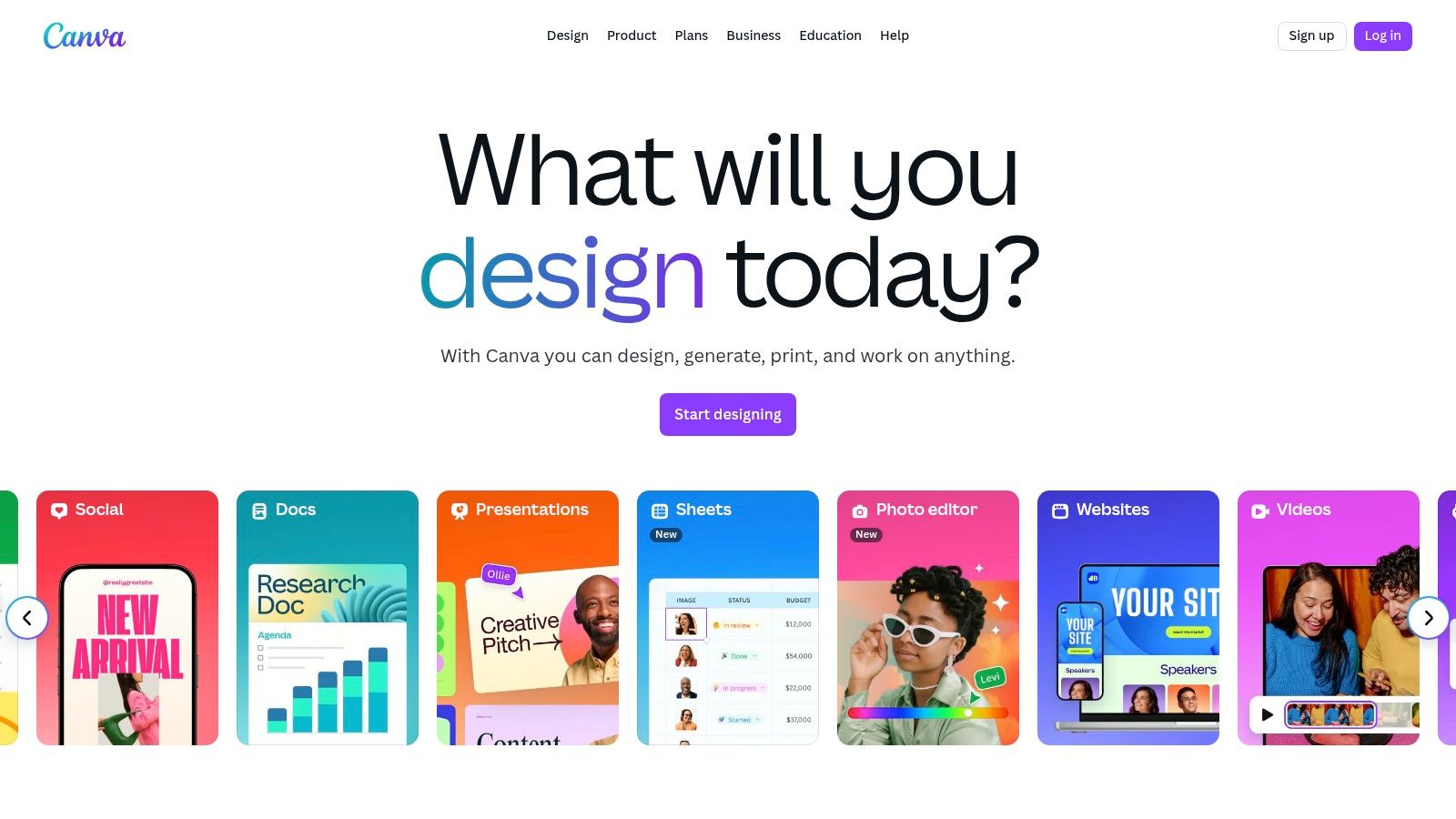
Unlike complex software like Adobe Creative Suite, Canva prioritizes a user-friendly, drag-and-drop interface. A practical use case for agencies is utilizing its Brand Kit to lock down client logos, fonts, and color palettes, then empowering junior team members to create on-brand social media assets using pre-approved templates. Its AI-powered Magic Studio further streamlines workflows by generating designs or resizing assets for different platforms in one click, making it one of the best content marketing tools for scaling visual content production efficiently.
Key Details & Pricing
- Best For: Marketing teams and agencies needing to quickly produce a high volume of branded visual content for social media and blogs.
- Pros: Very fast asset production for non-designers, massive template library and broad integrations, and strong for scaling social content creation.
- Cons: Teams pricing requires minimum seats and has changed recently; brand governance features are lighter than professional design suites.
- Pricing: A robust free plan is available. Canva Pro starts at $14.99/month for one person, and Canva for Teams starts at $29.99/month for the first 5 people.
- Website: Canva
7. Grammarly Business
Grammarly Business is a writing assistance platform that moves beyond simple spell-checking to help teams maintain brand consistency at scale. It offers real-time suggestions on grammar, clarity, and tone, ensuring that every piece of content-from emails and social media posts to blog articles-aligns with a predefined company style guide. This centralized control is its primary advantage, allowing marketing leaders to enforce brand voice guidelines automatically across their entire organization.
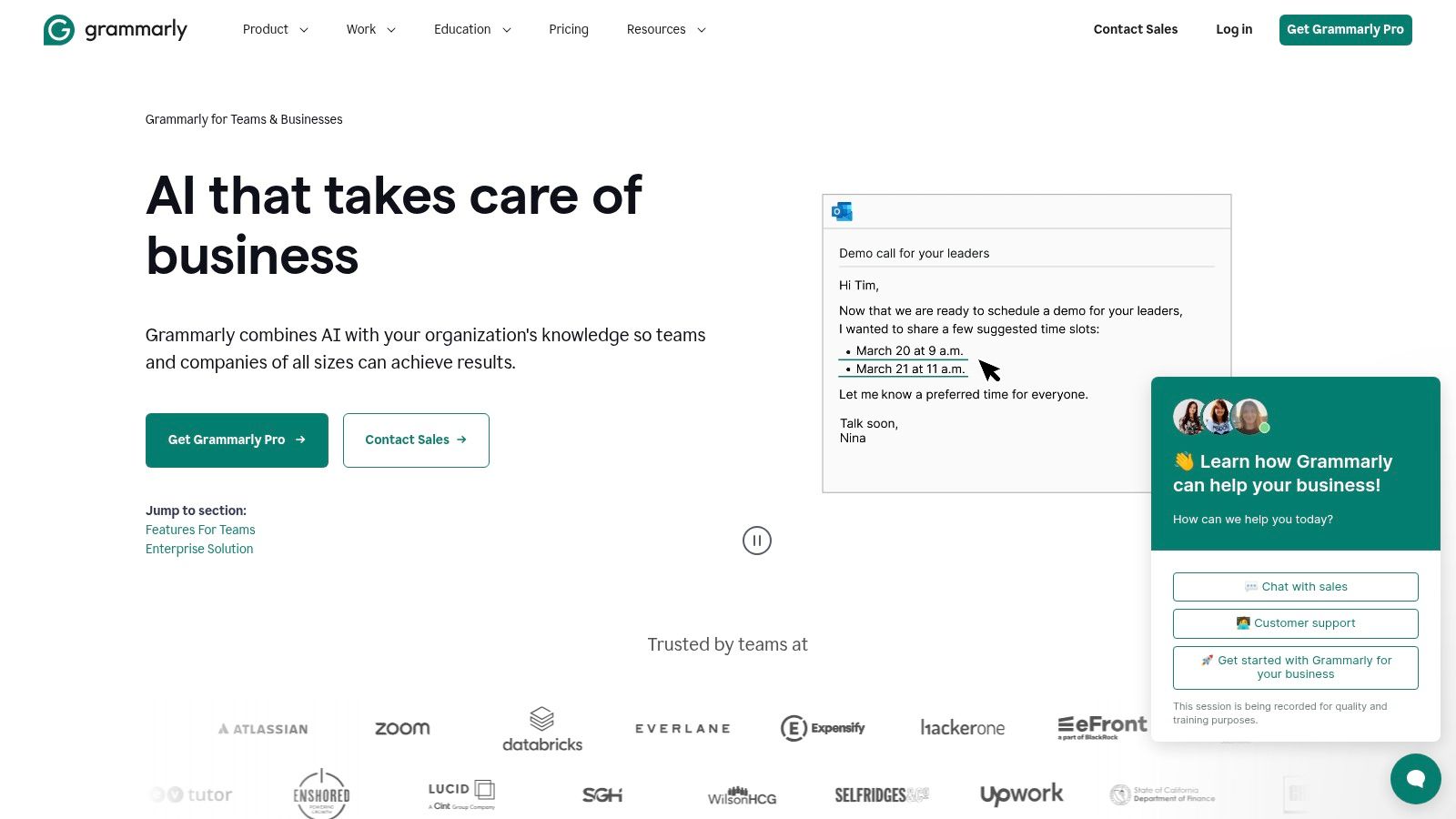
Unlike basic grammar tools, Grammarly Business allows agencies to create custom style guides for each client, defining rules for everything from acronyms to preferred tone (e.g., "confident" vs. "formal"). A practical use case is an agency managing three different clients with distinct voices; their team can switch between style guides to get tailored feedback, ensuring the copy for a fintech brand doesn't sound like copy for a lifestyle blog. This makes it one of the best content marketing tools for maintaining quality and consistency with a diverse client portfolio.
Key Details & Pricing
- Best For: Agencies and marketing teams needing to enforce a consistent brand voice and improve writing quality across all channels.
- Pros: Improves polish and editorial consistency quickly, easy adoption across browsers and apps, and analytics facilitate writing enablement.
- Cons: Does not replace deeper editorial strategy or fact-checking; may flag creative copy if guidelines are not finely tuned.
- Pricing: Starts at $15 per member/month (billed annually) for the Business plan. Custom pricing is available for enterprise needs.
- Website: Grammarly Business
8. Hootsuite
Hootsuite is a comprehensive social media management platform that excels in the content distribution phase of any marketing workflow. It centralizes scheduling, engagement, and analytics across multiple social networks, allowing agencies to manage complex client campaigns from a single dashboard. Its core strength lies in its robust scheduling and collaboration features, which streamline the process of getting approved content published at the most effective times. For example, its "Best Time to Publish" feature analyzes past performance data to recommend optimal posting times, which can increase engagement by an average of 35%.
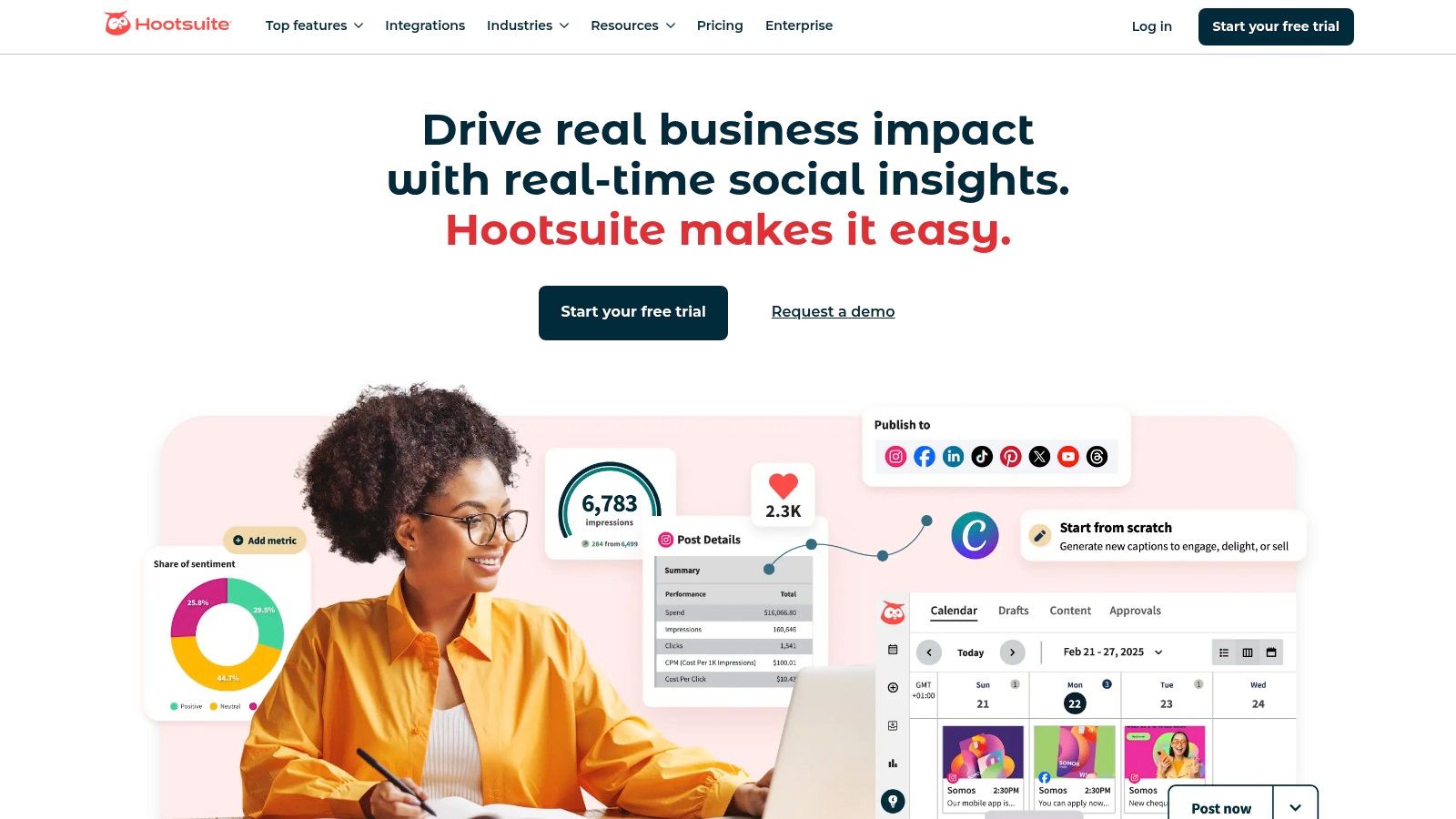
Unlike simple schedulers, Hootsuite offers powerful social listening and analytics tools that help agencies track brand mentions, monitor competitor activity, and measure content performance. A practical use case is an agency using the platform's unified inbox to manage all client comments and direct messages, while its AI-powered "OwlyWriter" generates captions and post ideas. This makes it one of the best content marketing tools for agencies focused on social media distribution and community management.
Key Details & Pricing
- Best For: Agencies and teams requiring a centralized platform for social media content distribution, engagement, and reporting.
- Pros: Robust feature set ideal for mid to large teams, a central inbox and automation reduce manual workload, and supports broad social channel integrations.
- Cons: Higher-tier plans can be costly for smaller agencies; some features are limited by social network API restrictions or plan level.
- Pricing: The Professional plan starts at $99/month, with Team plans at $249/month.
- Website: Hootsuite
9. Mailchimp
Mailchimp is a cornerstone email and marketing automation platform ideal for teams scaling their content distribution and nurturing leads. It excels at turning content assets like blog posts and guides into engaging newsletters and automated drip campaigns. Its core strength lies in its user-friendly interface, which simplifies complex tasks like audience segmentation and journey building, making it accessible even for teams without dedicated email marketers. Given that email generates an average ROI of $36 for every $1 spent, Mailchimp is a critical tool for monetizing content efforts.
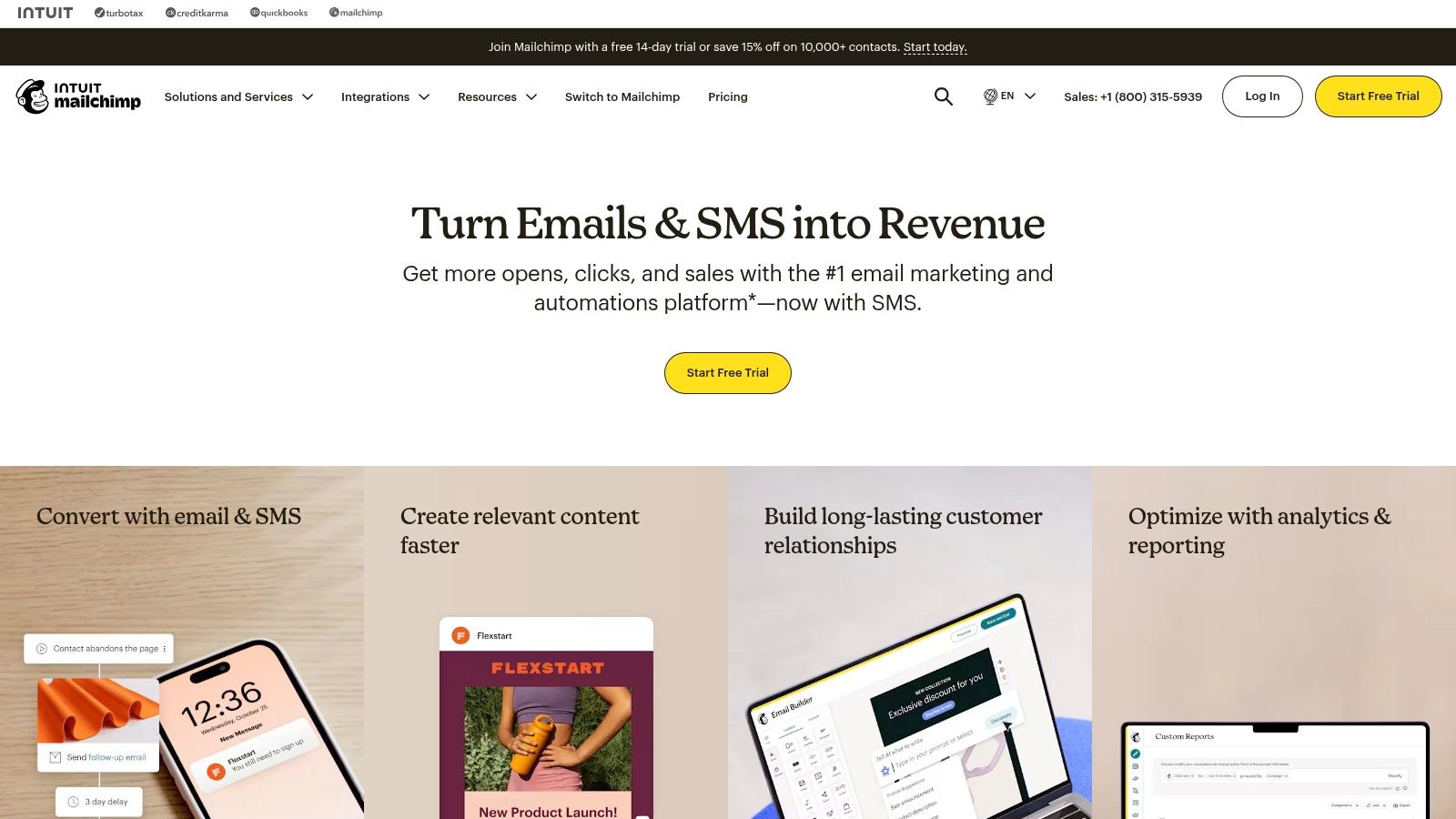
Unlike more complex marketing clouds, Mailchimp offers a direct and intuitive path to executing email-centric content strategies. A practical use case for agencies is using its visual journey builder to create a welcome series that delivers a sequence of educational content to new subscribers captured via a landing page form. This makes it one of the best content marketing tools for building and monetizing an audience directly. To see how it stacks up against similar platforms, you can learn more about lead generation automation tools.
Key Details & Pricing
- Best For: Small to medium-sized businesses and agencies needing a reliable, scalable platform for email marketing and audience engagement.
- Pros: User-friendly for small teams and scaling businesses, large ecosystem of templates and integrations, Pay-As-You-Go credits available for infrequent campaigns.
- Cons: Pricing increases significantly with contact list size and volume; some advanced automation features are restricted to higher-tier plans.
- Pricing: A free plan is available for up to 500 contacts. Paid plans start at $20/month for the Essentials plan, with Standard and Premium plans offering more advanced features.
- Website: Mailchimp
10. WordPress.com
WordPress.com is the managed hosting solution for the world's most popular CMS, which powers over 43% of all websites on the internet. It offers a streamlined way for agencies to launch and manage content-heavy websites, bundling hosting, security, and performance optimizations so teams can focus on creation rather than server maintenance. The platform's block editor and a new AI site builder accelerate the process from concept to a live blog or marketing site, making it a foundational tool for any content strategy.
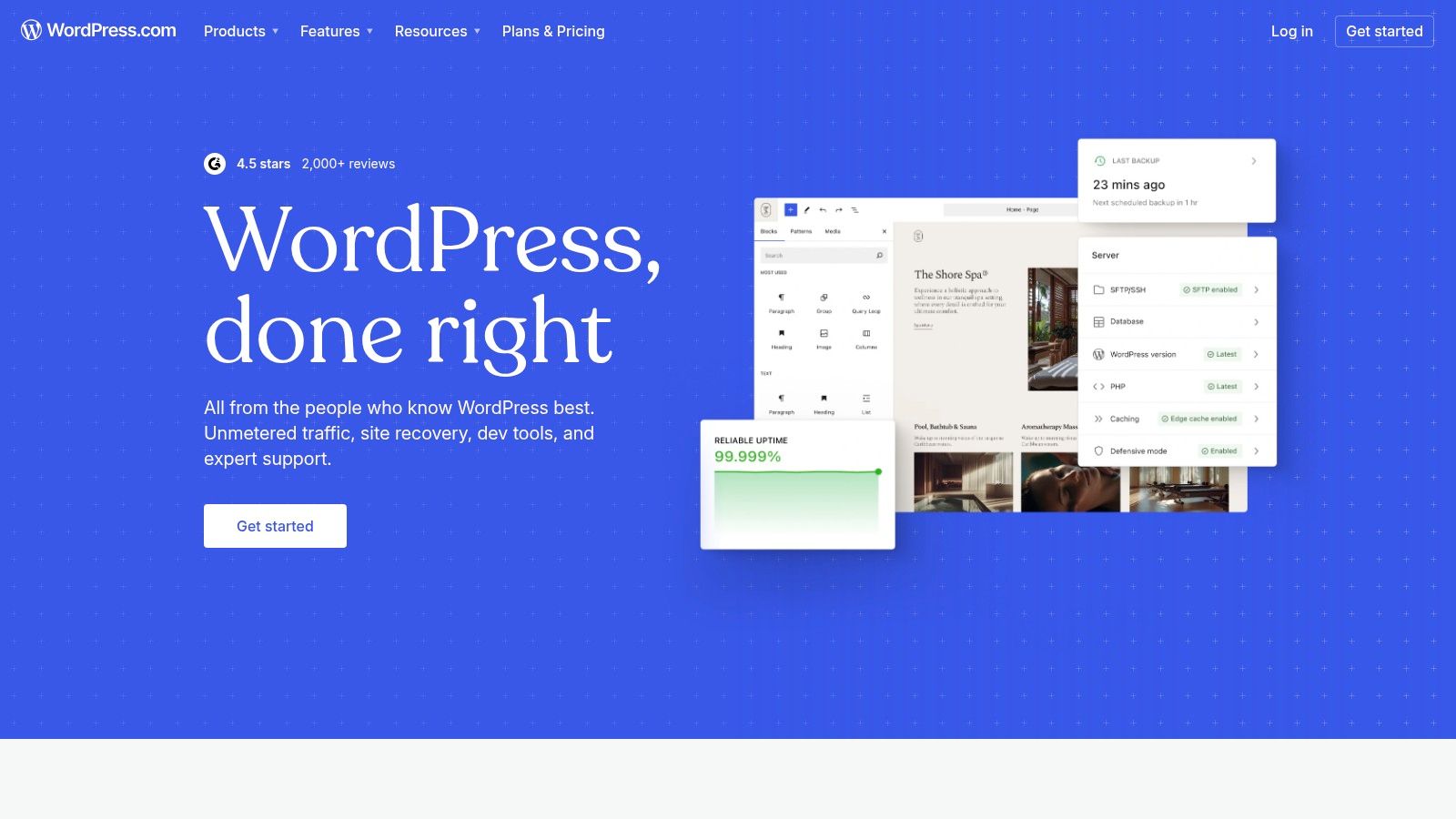
Unlike self-hosted options, WordPress.com simplifies the technical overhead with features like built-in CDN, SSL certificates, and automated updates. A practical use case for agencies is building a client's entire B2B content hub on a Business plan, integrating SEO plugins like Yoast and connecting it to other essential B2B lead generation tools. This setup provides a powerful, scalable foundation for publishing articles, case studies, and landing pages without requiring a dedicated IT team, solidifying its place among the best content marketing tools for accessibility and power.
Key Details & Pricing
- Best For: Agencies and teams needing a powerful, scalable, and managed CMS without the technical overhead of self-hosting.
- Pros: Highly flexible CMS widely adopted by content marketers, scales from personal blogs to full business websites, and an AI site builder simplifies initial website creation.
- Cons: Advanced customization and plugin access require higher-tier (Business+) plans; plugin management demands some technical knowledge.
- Pricing: Free plan available. Paid plans start at $4/month (billed annually), with the Business plan at $25/month.
- Website: WordPress.com
11. G2 – Content Marketing Software Category
G2's Content Marketing Software category isn't a single tool but a meta-resource for evaluating hundreds of them. It serves as a business software marketplace, aggregating millions of verified user reviews and comparisons to help agencies and marketing teams make informed purchasing decisions. With over 2.4 million verified reviews on the platform, this is an essential first stop for shortlisting tools based on real-world performance, user satisfaction, and market presence, cutting through marketing jargon.
Unlike vendor websites, G2 provides unfiltered user sentiment that reveals a tool's true strengths and weaknesses. A practical use case for an agency is using the comparison grid to evaluate three SEO platforms side-by-side, filtering reviews specifically from other mid-market agencies. This targeted approach de-risks investment and helps you find the best content marketing tools for your specific client needs and team size, moving beyond sponsored ads and feature lists.
Key Details & Pricing
- Best For: Agencies and teams conducting due diligence before investing in new content marketing software.
- Pros: Reduces purchase risk with peer-verified reviews, extensive filtering options (company size, features), and broad coverage of the entire content tool ecosystem.
- Cons: Sponsored placements can influence which tools appear most prominently, and the quality and depth of individual user reviews can vary.
- Pricing: Free to browse and compare software.
- Website: G2 – Content Marketing Software Category
12. AppSumo – Deals Marketplace for Marketers
AppSumo is a marketplace offering lifetime and heavily discounted deals on emerging software, making it a treasure trove for budget-conscious agencies. Instead of being a single tool, it’s a platform for discovering new content, SEO, and social media utilities without committing to expensive annual subscriptions. This makes it an ideal resource for testing innovative solutions or building a versatile tech stack on a lean budget.
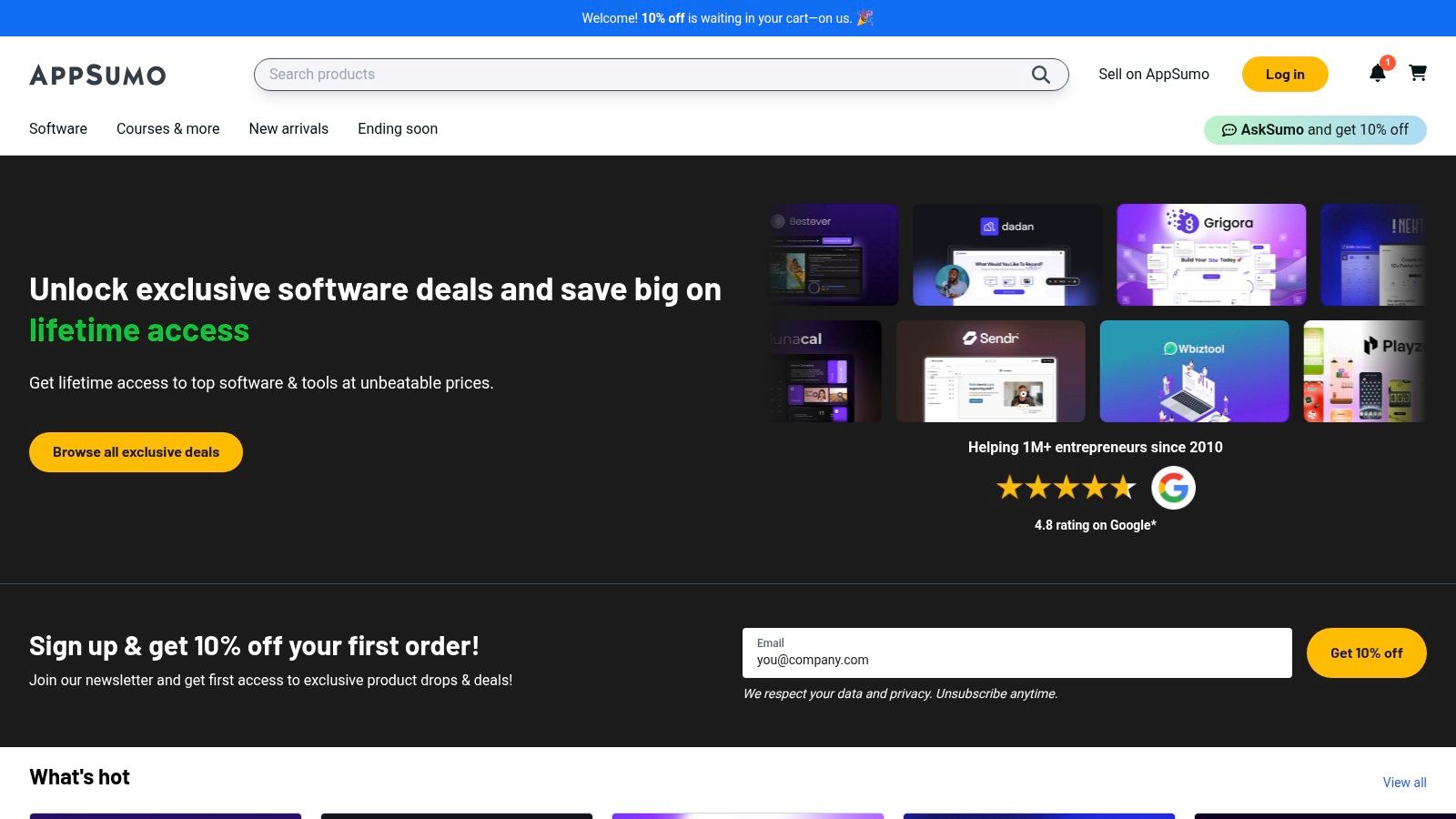
Unlike traditional software vendors, AppSumo’s value lies in its variety and cost-effectiveness. A practical use case for a content team is acquiring a lifetime deal on a new AI writing assistant or a video editing tool for a one-time fee of under $100. This approach allows agencies to experiment with different functionalities and find the best content marketing tools for their specific workflow, all while managing risk with refund windows.
Key Details & Pricing
- Best For: Agencies and freelancers looking to discover and test new tools without high recurring costs.
- Pros: Significant cost savings on software, a great platform for testing niche tools, and a centralized discovery hub for marketing utilities.
- Cons: Deal terms and product maturity can vary widely; not all tools have guaranteed long-term support or clear roadmaps.
- Pricing: Deals are typically one-time purchases, ranging from $39 to several hundred dollars for lifetime access.
- Website: AppSumo
Top 12 Content Marketing Tools Comparison
| Product | Core Features / Insights | User Experience & Quality ★ | Value & Pricing 💰 | Target Audience 👥 | Unique Selling Points ✨ |
|---|---|---|---|---|---|
| 🏆 FundedIQ | Curated startup leads, funding data, buying signals | ★★★★★ Manual verification, GDPR | $47/mo flat, no lock-ins | Growth, creative, content, recruitment, tech agencies | 40% more reachable contacts, real-time signals |
| HubSpot Content Hub | SEO tools, CMS, AI content assistant, native CRM | ★★★★ Mature ecosystem, onboarding | Expensive advanced plans | Marketing teams wanting integrated stack | Built-in SEO + CRM integration |
| Semrush | SEO research, rank tracking, content briefs | ★★★★ Broad toolset, frequent updates | Mid-high, add-ons add cost | SEO professionals, content marketers | Deep SEO and competitive intelligence |
| Ahrefs | Backlink analysis, content research, site audits | ★★★★★ Best link data, fast reports | Premium pricing | SEO experts, content teams | Best-in-class link/index data |
| BuzzSumo | Content discovery, influencer DB, brand monitoring | ★★★★ Strong PR data | Tiered prices, no free plan | PR, content marketers | Trend tracking, influencer insights |
| Canva | Design suite, templates, AI tools, collaboration | ★★★★ Fast design, vast templates | Team pricing minimum seats | Marketers, social content creators | AI-powered design, multi-channel support |
| Grammarly Business | Writing assistant, tone/style guides, compliance analytics | ★★★★ Improves clarity & style | Mid-range | Marketing teams focused on writing | Team style guides, analytics |
| Hootsuite | Social scheduling, listening, AI captions, reporting | ★★★★ Robust for mid-large teams | Higher-tier costly | Social media teams | Unified inbox, AI tools, wide social integration |
| Mailchimp | Email automation, journey builder, templates | ★★★★ User-friendly, extensive integrations | Increases with contacts | Small to scaling marketing teams | Pay-as-you-go credits, strong automation |
| WordPress.com | Managed hosting, CMS, AI site builder, plugins | ★★★★ Flexible, scalable | Higher tiers for plugins | Bloggers, content marketers | AI builder, extensive plugins (Business+) |
| G2 – Content Software | Reviews, comparisons, filtering, user ratings | ★★★★ Trusted user feedback | Free to browse | Buyers researching marketing software | Verified reviews, detailed feature filters |
| AppSumo – Deals Marketplace | Curated software deals, lifetime licenses | ★★★★ Cost-saving, discovery | Deals vary, often lifetime | Budget-conscious marketers, experimenters | Discounted licenses, refund windows |
Choosing the Right Tools to Scale Your Agency's Content
Navigating the expansive landscape of content marketing software can feel overwhelming, but building a powerful, integrated tool stack is the cornerstone of scaling agency operations and delivering exceptional client results. Throughout this guide, we’ve explored a curated selection of the best content marketing tools, from foundational SEO platforms like Semrush and Ahrefs to essential creation suites like Canva and Grammarly Business. Each tool serves a distinct purpose, yet their true power is unlocked when they work in concert.
The key takeaway is that there is no single "perfect" tool; the ideal stack is the one that aligns with your agency’s specific workflows, client base, and strategic goals. A creative branding studio might prioritize visual creation tools like Canva, while a performance marketing agency will live and breathe the data-rich environments of Semrush or HubSpot. Your selection process should be a strategic exercise, not just a feature comparison.
A Framework for Building Your Agency's Tool Stack
Before committing to a new subscription, guide your decision-making process by asking these critical questions:
- Integration and Workflow: How well does this new tool integrate with our existing platforms (e.g., our CRM, project management software, or CMS)? A seamless connection between tools like HubSpot and WordPress can save hundreds of hours annually by eliminating manual data transfer and streamlining publishing workflows.
- Scalability and Pricing: Does the pricing model support our agency's growth? Look for plans that scale based on usage or client accounts, rather than imposing restrictive per-seat costs that penalize you for expanding your team. Platforms like Hootsuite and Mailchimp offer tiered plans that grow with you.
- Team Adoption and Training: How intuitive is the user interface? A tool with a steep learning curve can create a significant bottleneck. Consider the time and resources required to train your team. A platform with robust tutorials, certifications, and strong customer support will ensure a higher rate of adoption and a faster return on investment.
The Most Critical Factor: Reaching the Right Audience
Ultimately, the most sophisticated content creation and distribution engine is ineffective if your message doesn't reach an audience with the budget and intent to buy. This is where strategic audience intelligence becomes a non-negotiable part of your toolkit. While SEO tools help you capture existing demand, specialized platforms can help you proactively target high-value prospects.
For agencies targeting the lucrative B2B tech and startup ecosystem, this means identifying companies at their precise moment of growth. A tool like FundedIQ, which pinpoints recently funded startups, transforms your content strategy from a passive, inbound play into an active, outbound powerhouse. By aligning your agency’s expertly crafted content with a pre-qualified list of decision-makers who have just secured capital, you close the loop between creation and conversion, demonstrating undeniable ROI for your clients. Building your stack is about more than just efficiency; it’s about strategically deploying the best content marketing tools to drive measurable business growth.
Ready to ensure your content reaches decision-makers with fresh budgets? FundedIQ delivers hand-curated lists of recently funded startups directly to your inbox, giving your agency a critical first-mover advantage. Stop guessing and start targeting the right clients at the right time by visiting FundedIQ to see how it works.




